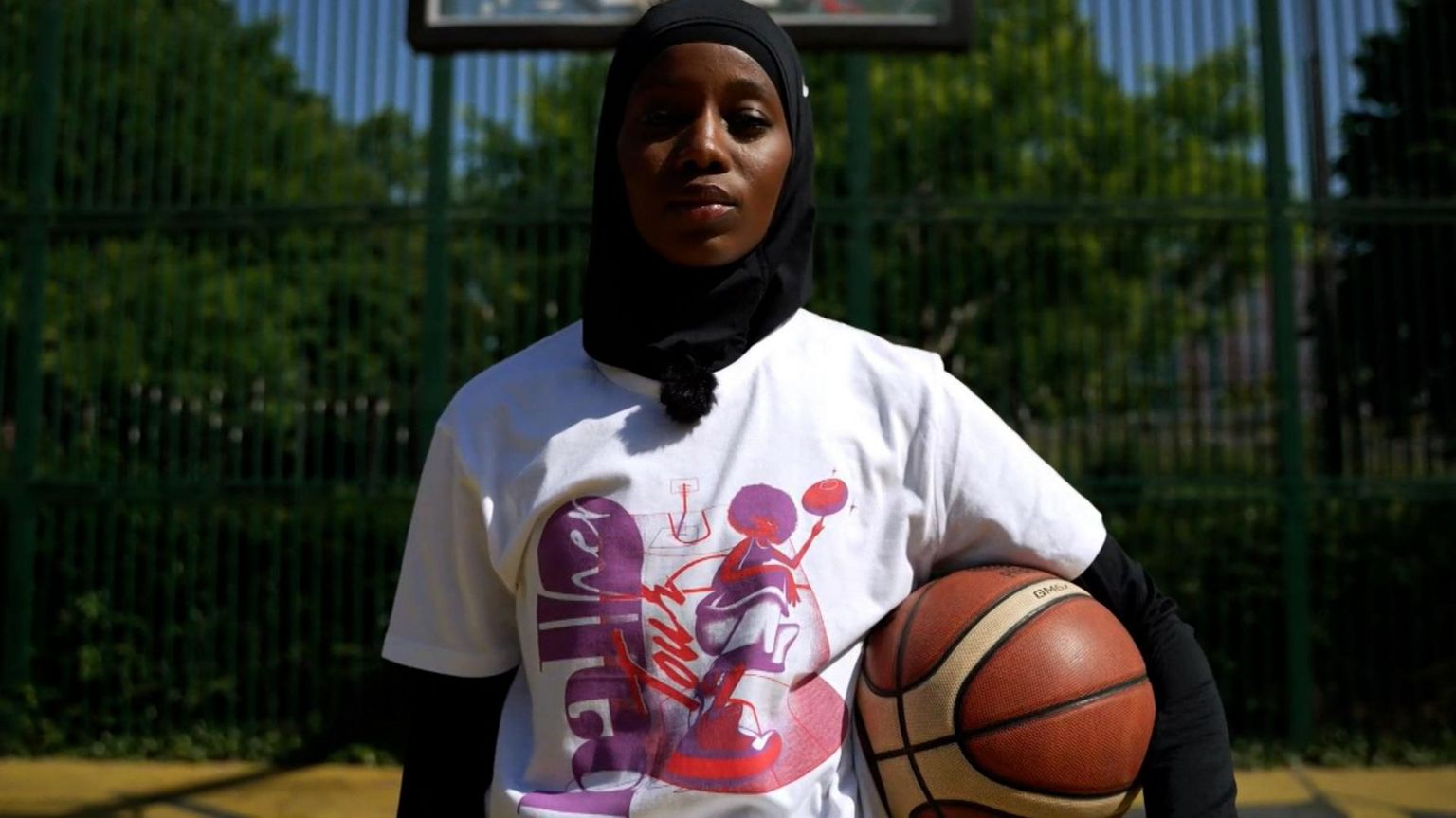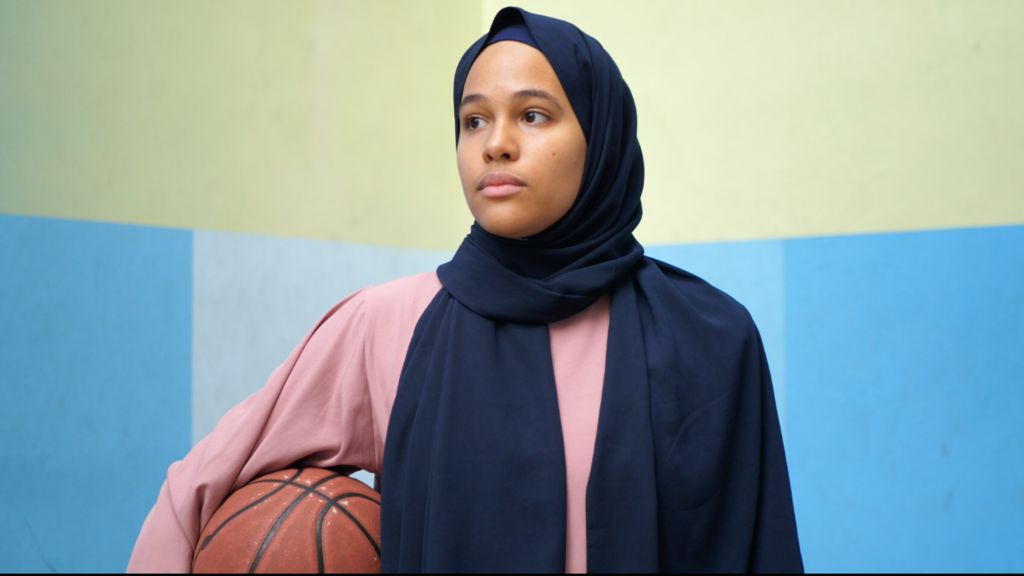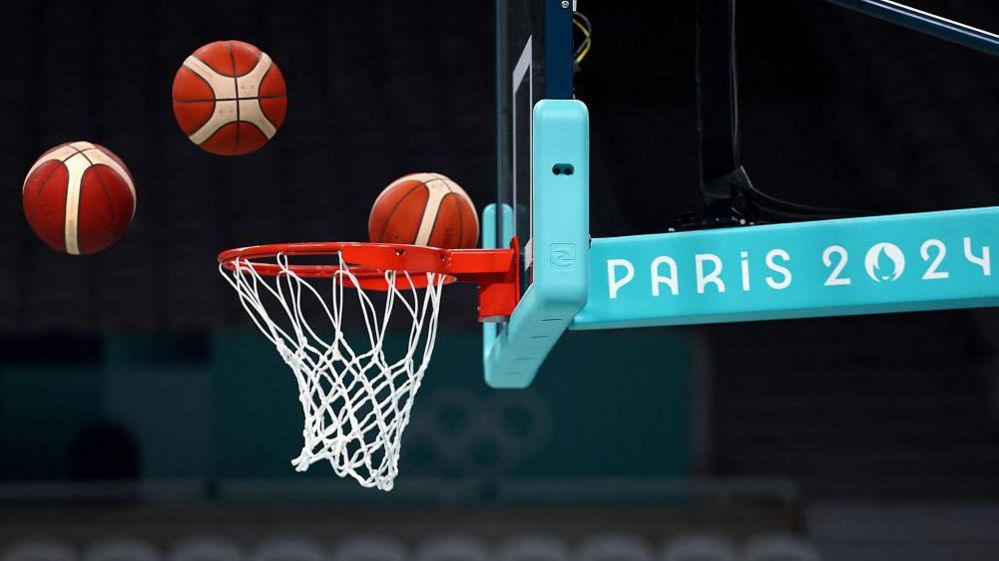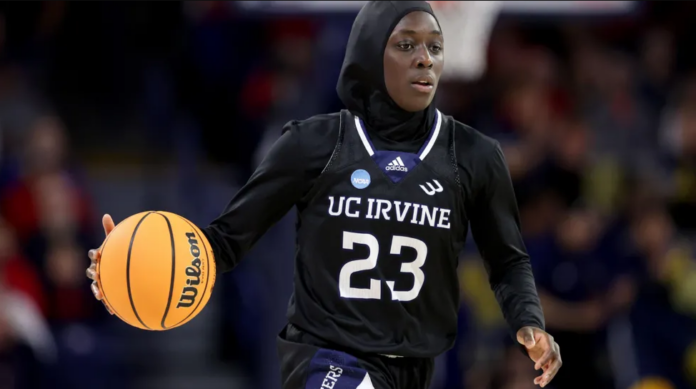In a sweltering Paris, Diaba Konate waves emphatically with a beaming smile as she walks towards our meeting spot near the Louvre. She’s wearing a number 23 jersey. Of course she is – basketball is her passion.
The 23-year-old point guard has recently returned to her home city after almost six years in the United States, where she enjoyed a successful college career on a full scholarship from Idaho State University, later transferring to UC Irvine and helping them reach the NCAA tournament for the first time since 1995.
Konate came up as a rising star with the French national youth team, winning medals including silver in 3×3 basketball at the 2018 Buenos Aires Youth Olympics – an experience she describes as the “best memory” of her career and something she dreamed of recreating at the Paris Olympic Games.
But she has mixed feelings about being back home – because she’s banned from competing in France.
The reason?
She wears a hijab.
Last year, when Konate came home for the summer break to play a 3×3 tournament, she discovered she wasn’t allowed to step on court – due to a rule change made by the French Basketball Federation (FFBB) in 2022 which expressly bans any kit “with a religious or political connotation”.
“I just couldn’t believe it,” she says, initially thinking “it was a prank”.
“It cannot happen to me. I thought we were family. Like, it’s me guys – we used to play together, I’m part of you. I’m still the same person, nothing has changed.
“That really broke my heart.”
It was in the US during the height of the Covid pandemic that Konate chose to start wearing the hijab.
“For the last three years it’s really been my essence and something that’s a part of me,” she says.
“I went through a hard time and needed something that would give me hope. I reflected on myself and my identity when everything was uncertain and I was feeling lonely. I was born Muslim so I wanted to learn more about my religion and eventually I found the answers to all of my questions.
“It’s very hypocritical for France to call itself the country of freedom, of human rights, but at the same time not allowing Muslims or their citizens to show who they are.”
‘I was humiliated in front of everyone’
 Image caption: Salimata Sylla had played wearing a hijab for three years until the ban
Image caption: Salimata Sylla had played wearing a hijab for three years until the ban
Stories like Konate’s have become familiar in all levels of basketball which fall under FFBB governance, meaning hijab-wearing ballers are facing restricted access to training and competition opportunities – and even feeling an impact on their social wellbeing.
In a community basketball court in the 19th district of Paris, Salimata Sylla is hosting one of her ‘Ball.Her’ sessions – which she describes as a “safe space” for all women and girls interested in sport – regardless of whether they wear the hijab. Since she started running them around Paris last year, as many as 60 women and girls have attended at a time.
“I’m in front of you today because of basketball,” says Sylla.
“Basketball means everything to me. It’s not just a word; it saved my life. I lived in a neighbourhood where there were drugs. Basketball helped me to be a better person, to have discipline in my life and become the best version of myself.”
Sylla was on the French league team Aubervilliers, but she hasn’t played with them for over a year.
In January 2023, moments before she was due to captain Aubervilliers as a point guard, Sylla’s coach had to break the news that the referee would only allow her on the court if she removed her sports hijab.
As a Muslim woman who had played whilst wearing the hijab for three years up until that point, it wasn’t even an option for her.
She recalls telling the match official: “You see me like this, and you’re not going to see me any other way.”
“I was humiliated in front of everyone,” Sylla says. “This is the country where I was born and that day they just put me on the side.”
After a three-hour journey from Paris to the north of France, Sylla sat on the bench and watched the team play without her.
Sylla is keen to challenge “ignorant” mindsets, saying: “They think if you wear the hijab, you’re just in the kitchen and doing nothing with your life.
“But I’m the example: I’m not just a Muslim, I’m not just a woman wearing the hijab – I’m an entrepreneur, I work in marketing, I have a masters degree, and I play basketball as well – so why are they putting me on the side?”
‘We will never have a role model if this rule stays’
 IMAGE SOURCE: BASKET POUR TOUTES
IMAGE SOURCE: BASKET POUR TOUTES
Image caption: Helene Ba, co-founder of Basket Pour Toutes (Basketball For All), believes the policy is a “catastrophe for French sport”
Over the three years since France’s controversial “Islamist separatism” law was passed, it has gradually permeated aspects of French society, including competitive sports.
The rule applies not only to players but also to coaches and referees – officially excluding anyone wearing a sports hijab from the competitive space altogether.
This has been the case for years at all levels under the French Football Federation (FFF), despite Fifa lifting its religious headgear global ban a decade ago. Basketball’s world governing body Fiba also lifted its ban in 2017.
Both international rule changes were a breakthrough after years of campaigning led by Muslim sportswomen.
But as the Paris Olympics make history as the first to achieve numerical gender parity on the field of play, Muslim French women and girls continue to face barriers on their home turf – which campaigners like Amnesty International say is a “violation of their human rights” with a “devastating impact”.
“It’s a catastrophe for French sport – for women’s sport,” says Helene Ba, who after experiencing a similarly traumatic experience to Sylla at grassroots level co-founded Basket Pour Toutes (Basketball For All).
It is a collective dedicated to tackling discrimination in basketball through activism and events.
“I don’t necessarily agree with the word ‘choice’,” Ba says, considering the situation facing Muslim female players.
“It makes it seem like it’s equitable or fair, which it isn’t. They don’t want us to choose, they just want us to forget about our identity and convictions, so it didn’t feel like a choice.
“I will never compromise my beliefs or my values, especially because I know that this is an unfair rule.”
In September last year, the French sports minister Amelie Oudea-Castera confirmed that the hijab was banned for all the French team at the Olympics, under France’s principles of secularism – laicite. The ruling was criticised by the UN human rights office and the International Olympic Committee subsequently confirmed that hijabs were allowed inside the athletes’ village.
In April, Paris 2024 chief Tony Estanguet told BBC Sports Editor Dan Roan that it was “up to the countries, the delegations and the National Olympic Committees to decide for the athletes – if they want other rules in place or not” maintaining there is “nothing illegal by the French delegation – it’s their decision”.
Most often translated as secularism in English, laicite does not stipulate that France’s people should drop any religious customs or symbols, but, instead, that state and public institutions should be expressly free of them.
This concept – central to France’s identity – stems from the law of 1905, which sealed the separation of the church and state. But human rights groups have criticised the manner in which it is being interpreted for the France of today.
Ba, who also specialises in human rights and humanitarian law, says that laicite is “highly misunderstood” and “does not prevail over human rights”.
“It’s been instrumentalised to erase all differences and more specifically the Muslim identity – especially women who wear the hijab,” Ba says.
“Some of us are becoming activists because of this rule, but what I also want to emphasise is most of us are left without anything – especially younger Muslim women because they don’t know why they’re being excluded. They don’t have any other alternative so some of them just stop playing sport altogether.
“Once a rule targets a minority group and creates discrimination and infringes on people’s rights, it should be everyone’s concern. And so today it’s us – but tomorrow it may be you.
“We grew up without any role models and we will never have – if these rules stay in place – a French hijabi athlete representing the national team.”
‘Games would have been cherry on top of my career’
 IMAGE SOURCE: GETTY IMAGES
IMAGE SOURCE: GETTY IMAGES
Image caption: Olympic basketball will be watched by millions during the Paris Games
Meanwhile, Konate is still deciding on whether to pursue her sport. But at these Olympic Games, she will never know what may have been.
“I’m focusing on myself to accept what’s happening,” she says. “I really feel like I’ve had an amazing career – especially playing with the French national team. I think it’s the dream of every athlete – to represent their country.
“It would have been the cherry on top.”
She too has joined Basket Pour Toutes to advocate publicly for hijab-wearing athletes, but with mixed feelings.
“For me, it’s ridiculous. I shouldn’t have to do this; we shouldn’t have to do this,” Konate says.
“It is just very heartbreaking for me to have to fight for that – I’m doing it and I will keep doing it, but it’s just sad because there are more important issues that we should be focusing on than Muslim women wearing the hijab on the court.”

